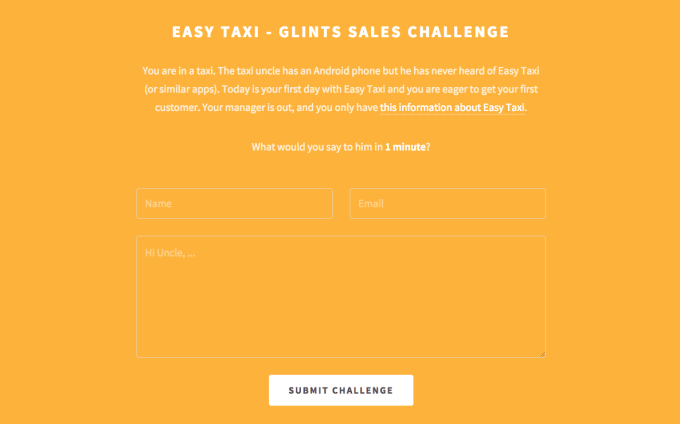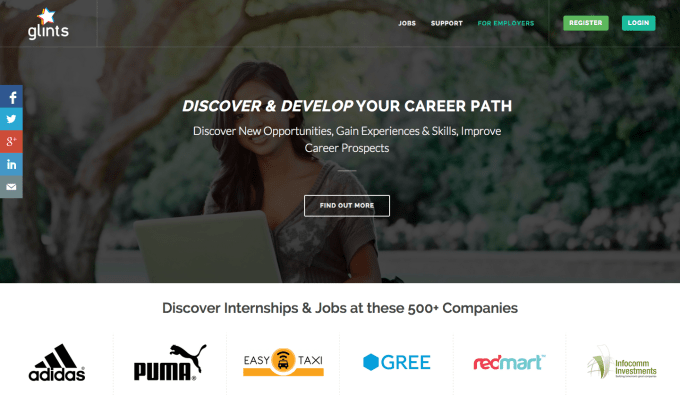It may be common in the U.S., but here in Asia we don’t often write about twenty-somethings pausing their education for a startup. So it’s notable that Glints, a Singapore-based startup that helps graduates enter the workforce, closed a SG$475,000 (US$380,000) seed round today.
The company’s founders might just be the youngest venture-backed team in Southeast Asia — and they already graduated Singapore-based accelerator JFDI Asia. Glint’s founding trio — Oswald Yeo (CEO), Seah Ying Cong (CTO), Looi Qin En (CTO) — are aged 22, 21 and 21 respectively. Refreshingly, despite their youth, the team looks to have plenty of savy.
Yeo told TechCrunch in an interview that this seed round was over-subscribed, but the team chose to pass on US$250,000 of additional money from other investors in favor of working with those they know well.
“We didn’t want to raise more than we needed, plus we wanted investors who we are comfortable with and who can provide more than just money,” he explained.
The round, as it is, was led by East Ventures, with participation from 500 Startups, SPH Media Fund, Singapore Infocomm Investments (IIPL), 8 Capita and Pix Vine Capital. It also included private backers, such as angel investors John Tan and Darius Cheung who had mentored the team since its time with JFDI Asia.
Helping Graduates Enter The Job Market
Rather than taking on LinkedIn, a tall challenge that many job-focused startups seem to try to do, Glints aims to complement the professional networking site. It focuses on catering to graduates who want to enter the workforce with the ‘right’ job or internship — given that the founding team deferred places at U.S. graduate schools to pursue the startup, it is certainly a problem they have personal experience of.
“There’s a huge gap between what is taught in schools and what is needed in the marketplace,” Yeo said.
Glints operates just like most job-seeking sites with a portal of open opportunities, but it tries to offer a more rounded ‘guide’ for graduates, including training and development opportunities. One part of that is challenges that a range of companies set to give Glint users a small slice of working life in certain industries.
Rocket Internet-backed Easy Taxi challenges them to develop a sales pitch for hiring taxi drivers to its platform, for example, while media giant SPH tests reporting chops with a breaking news assignment.

These tasks, Yeo said, not only help candidates get a slice of experience, but they help them stand out from the crowd since each successful task is rewarded with a badge displayed on their Glints profile. There is also a personality test because prospective employers “are not just looking for skills, they seek aptitude and culture fits,” Yeo said.
Glints currently operates using a talent scout model which lets employers list vacancies for free, then pay only when they interview a candidate.
Plans To Expand Outside Of Singapore
The service is focused on Singapore, where it counts over 7,000 registered students and some 600 companies. But, with just 100,000 college students in the country, it is preparing to look overseas at some point this year.
Yeo said the priority is to establish its business in its home market, after which the team is weighing up a regional expansion starting with Indonesia, or a more audacious branch out into the U.S.. With expansion in mind, Glints is likely to seek another round of funding later this year, Yeo revealed.

Yeo “indefinitely deferred” a place at the University of California — his co-founders did the same at Wharton and Stanford — a move that he admitted is taking his family some time to come to terms with.
“There was a lot of resistance from friends and family in Singapore, but my friends in the U.S. were very supportive,” he said. That’s not uncommon in Asia, and Yeo pointed out that he could always return to his studies — plus, presumably the SG$500,000 raised by investors will help validate that decision with his family.
Glints will be one to watch in Asia, even if it is just for the fact that the founding team is so young. Society in many parts of this region is still traditionally risk-averse and preferential to jobs at big companies — there are few cases of early twenty-somethings gaining backing from Southeast Asia’s venture capital firms and putting a startup ahead of their education.
